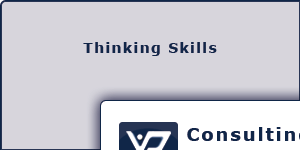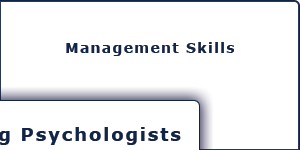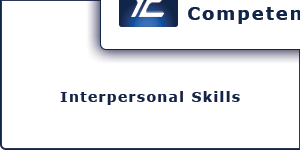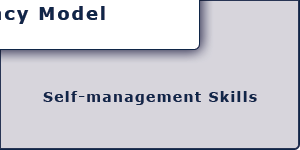Competencies
Y2 Consulting Psychologists Leadership Competency Model

Competency is defined as: "A cluster of related knowledge, skills, and attitudes that affects a major part of one's job (a role or responsibility), that correlates with performance on the job, that can be measured against well-accepted standards, and that can be improved via training and development." (Training Magazine: July, 1996).
Competency models, like Y2CP's, are helping government and corporate clients take a more integrated approach in designing improvements to human resource management, including career counselling/management, training and development, succession planning, teambuilding, performance improvements, workplace assessment/job redesign, and selection/on-boarding.
Below are the main dimensions of Y2CP's model. Consult our experts for more detailed information about our competency model and how we can be of assistance to you.
Y2CP's Model
Y2CP's Model




Thinking
Thinking
Strategic Thinking: Uses understating of broad issues, trends and organizational direction to anticipate emerging opportunities and threats; adopts a comprehensive perspective in addressing current, emerging and long-term issues.
Analytical Thinking: Analyzes problems and situations, identifying key issues and drawing accurate conclusions and viable solutions.
Judgment: Reaches sounds decisions on possible solutions and courses of action.
Creativity: Identifies innovative solutions to problems and situations.
Organizational Know-how: Use knowledge of own and others' organizational workings (e.g., culture, key players, conflicting demands) to achieve results.
Management
Management
Action Management: Delivers successful and cost-effective results through planning, directing, organizing, monitoring and evaluating activities, processes and systems.
People Management: Ensures that people have the support and tools they need and that the workforce as a whole has the capacity and diversity to meet current and longer-term organizational objectives.
Financial Management: Plans and manages financial resources and assets to optimally advance organizational objectives, while fulfilling organizational obligations for rigorous financial management.
Client Service: Focuses efforts on meeting and, where possible, exceeding client expectations.
Risk Management: Identifies, evaluates and manages risks while working towards organizational goals.
Change Management: Champions and manages change, facilitating transition by the people and organizational systems involved.
Partnering: Cultivates and sustains partnerships that advance organizational goals.
Managing Diversity: Creates a workplace where diversity is valued and capitalized on.
Interpersonal
Interpersonal
Communication: Listens actively, communicates clearly, and tailors communication to the intended audience, situation and purpose.
Interpersonal Relations: Advances the work of the organization by interacting with others in ways that develop mutual understanding and productive working relationships.
Teamwork: Contributes actively and fully, and works collaboratively with others to reach organizational goals.
Team Leadership: Coordinates the team's efforts, providing direction and guidance while empowering and inspiring team members to achieve results.
Influencing: Gains others' agreement, support, and commitment to further the goals of the organization.
Self-management
Self-management
Values and Ethics: Demonstrates professional, ethical, and people values.
Adaptability: Effectively adapts to changing conditions, uncertainty and diverse people.
Resilience: Remains effective and productive in the face of stress.
Initiative: Seizes opportunities to originate action and surmount obstacles to achieve organizational goals.
Self-awareness: Engages in productive self-reflection and seeks feedback and learning opportunities to better understand personal limits, capitalize on strengths, and address developmental needs.
Self-confidence: Demonstrates realistic belief in own ideas and talents.
Y2 Consulting Psychologists Leadership Competency Model
© 2010 Y2 Consulting Psychologists, Inc. All Rights Reserved.